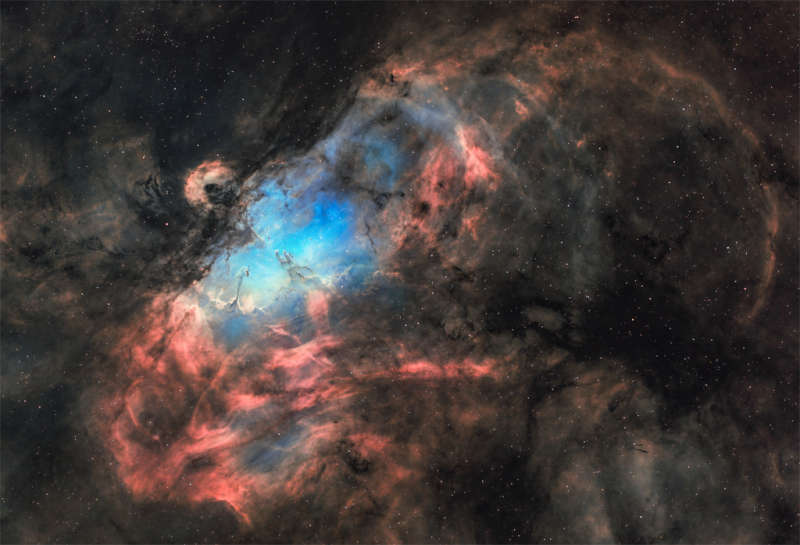Credit & Copyright: Charles Bonafilia
Explanation:
A star cluster around 2 million years young surrounded by
natal clouds of dust and glowing gas,
Messier 16 (M16) is also
known as The Eagle Nebula.
This beautifully detailed image
of the region adopts the colorful Hubble palette and includes
cosmic
sculptures
made famous in Hubble Space Telescope close-ups of the
starforming complex.
Described as elephant trunks or
Pillars
of Creation,
dense, dusty columns rising near the center are light-years in length but
are gravitationally contracting to form stars.
Energetic radiation from the cluster stars erodes material near
the tips, eventually exposing the embedded new stars.
Extending from the ridge of bright emission left of center
is another dusty starforming column known as the
Fairy
of Eagle Nebula.
M16 lies about 7,000 light-years away,
an easy target for binoculars or small telescopes in a
nebula rich part of the sky
toward the split constellation
Serpens Cauda
(the tail of the snake).
As framed, this telescopic portrait of the Eagle Nebula is about 70
light-years across.
1999 2000 2001 2002 2003 2004 2005 2006 2007 2008 2009 2010 2011 2012 2013 2014 2015 2016 2017 2018 2019 2020 2021 2022 2023 2024 2025 2026 |
Yanvar' Fevral' Mart Aprel' Mai Iyun' Iyul' Avgust Sentyabr' Oktyabr' Noyabr' Dekabr' |
NASA Web Site Statements, Warnings, and Disclaimers
NASA Official: Jay Norris. Specific rights apply.
A service of: LHEA at NASA / GSFC
& Michigan Tech. U.
|
Publikacii s klyuchevymi slovami:
Tumannost' Orla - M 16 - Eagle Nebula
Publikacii so slovami: Tumannost' Orla - M 16 - Eagle Nebula | |
Sm. takzhe:
Vse publikacii na tu zhe temu >> | |
